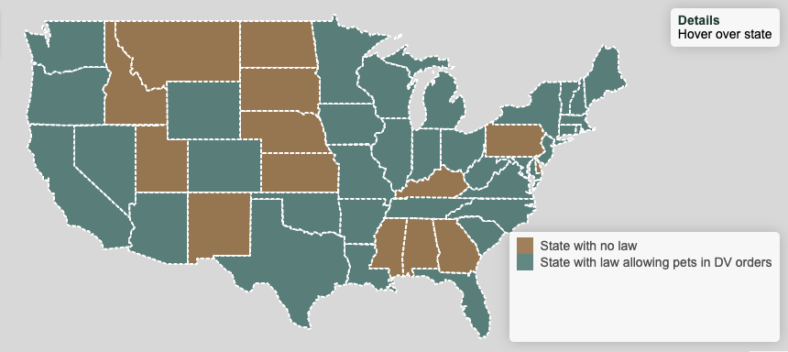Pets Are Victims of Domestic Violence in 70% Of Cases, Study Finds
A staggering 70% of domestic violence victims have reported that their abusers either threatened, injured, or killed their family pets, according to the AKC.
This alarming statistic underscores the profound impact of domestic violence on all family members, including the four-legged ones. Abusers often target pets as a means of exerting control, instilling fear, or punishing their victims. The emotional bond between victims and their pets is deep, making threats or harm to these animals a powerful tool for manipulation.
Furthermore, the safety and well-being of their pets play a significant role in the decisions victims make regarding their abusive situations. Studies have shown that 18 to 48% of domestic violence victims delay their escape from an abusive environment due to concerns about the welfare of their pets.

This hesitation stems from the fear of leaving pets behind in a potentially harmful situation and the lack of pet-friendly shelters or accommodations. The intertwined fate of victims and their pets highlights the need for more comprehensive support systems that consider the well-being of both humans and animals in domestic violence scenarios.
Domestic Violence And Pets
Research underscores the gravity of the situation. A nationwide survey from 1997 involving 50 of the largest domestic violence shelters in the U.S reported that 85% of women and 63% of children in these shelters also witnessed incidents of animal abuse. This distressing reality intensifies the tragedy, as many victims hesitate to leave dangerous situations, fearing for their pets’ fate. The AKC Humane Fund has been proactive in addressing this issue since 2010, providing over 80 grants to shelters and organizations to aid in caring for the pets of domestic violence victims.

For many victims, their pets represent a beacon of trust and companionship in an otherwise tumultuous life. Yet, the sad reality is that numerous shelters, which could serve as sanctuaries for these victims, do not permit pets. This lack of provision further complicates the decision for victims to leave their abusive environments. Recognizing this, the AKC Humane Fund has initiated campaigns to financially support local domestic violence shelters that are pet-friendly. Through these efforts, shelters can offer food, supplies, and support to pets, ensuring that both the victim and their pet find safety away from danger.
Protections for Pets Under Domestic Violence Acts

Further emphasizing its commitment, the AKC, during its recent board meeting, introduced a new Canine Legislation Position statement on “Protections for Pets Under Domestic Violence Acts.” The statement advocates for additions to state domestic violence statutes, allowing for protective orders that shield pets from potential harm or alienation. Such provisions would prohibit alleged abusers from contacting the pets and grant temporary exclusive care or control of the pet to the alleged victim. Importantly, these provisions would not alter the legal status of animals as property.
October is Domestic Violence Awareness Month
October, recognized as Domestic Violence Awareness Month, is a crucial period dedicated to highlighting the widespread issue of domestic violence and its profound effects on families and communities. It serves as a stark reminder of the silent struggles many endure behind closed doors and emphasizes society’s collective role in addressing and eradicating this menace.
During this month, various organizations, communities, and individuals unite to spearhead events, campaigns, and initiatives to educate the public about the signs of domestic violence and the resources available for victims. One such organization making notable strides in this area is the American Kennel Club’s Humane Fund.
The AKC Humane Fund has recognized the intricate relationship between domestic violence and the maltreatment of pets. Understanding that pets often become collateral victims in violent households, the AKC Humane Fund has launched campaigns to support not only the human victims but their four-legged companions as well. Their initiatives aim to financially assist local domestic violence shelters that are pet-friendly, ensuring that victims do not have to choose between their safety and the well-being of their pets. Through their efforts, these shelters can offer essential supplies, food, and support to pets, providing a sanctuary for both the victim and their beloved animal.
Furthermore, the choice of October for Domestic Violence Awareness Month, as it leads into the holiday season, is poignant. While many anticipate joyous family gatherings, others fear the potential escalation of violence in their homes. The AKC Humane Fund’s initiatives during this month underscore the importance of community support, aiming to ensure that every individual, human or pet, can look forward to a future free from fear and abuse.
Map of State Laws Allowing Domestic Violence Orders to Include Pets

As of 2022, 36 states, including D.C. and Puerto Rico, have enacted laws that include pets in domestic violence protection orders.
| Alaska | Since 2016, protective orders can include pets, defining them as animals kept for companionship, excluding certain working dogs and rodeo animals. |
| Arizona | 2010 amendments allow courts to grant exclusive care of any animal to the petitioner. |
| Arkansas | 2011 laws include pets in protection orders and recognize emotional abuse involving pets. |
| California | From 2014, courts can grant exclusive care of any household animal to the petitioner. |
| Colorado | 2010 laws include crimes against animals as a form of domestic violence. |
| Connecticut | Courts can issue orders protecting any household animal. |
| D.C. | Protection orders can include directives for the care of domestic animals. |
| Florida | Protection orders can prevent harm to family pets and grant temporary exclusive care. |
| Hawaii | Restraining orders can include directives for household animals. |
| Illinois | Courts can grant exclusive care of any household animal to the petitioner. |
| Indiana | From 2017, courts can grant exclusive care of any household animal to the petitioner. |
| Iowa | Courts can grant exclusive care of pets and companion animals. |
| Louisiana | Courts can grant exclusive care of any household pet. |
| Maine | Protective orders can include directives for household animals. |
| Maryland | From 2011, protective orders can grant temporary possession of pets. |
| Massachusetts | Courts can grant exclusive care of any household animal. |
| Michigan | Protective orders can include directives for household animals. |
| Minnesota | Protective orders can include directives for household pets. |
| Missouri | 2021 laws allow protective orders to include provisions for household pets. |
| Nevada | |
| New Hampshire | Protective orders can include directives for household animals. |
| New Jersey | 2012 laws allow protective orders to include provisions for household pets. |
| New York | Protective orders can include directives for household animals. |
| North Carolina | Protective orders can include directives for household animals. |
| Ohio | From 2014, protective orders can grant exclusive care of companion animals. |
| Oklahoma | Protective orders can include directives for household pets. |
| Oregon | Protective orders can include directives for household pets. |
| Rhode Island | 2019 laws allow protective orders to include provisions for household pets. |
| South Carolina | Protective orders can grant exclusive care of household pets. |
| Tennessee | Protective orders can include directives for household animals. |
| Texas | Protective orders can grant exclusive care of pets. |
| Vermont | Protective orders can include directives for household animals. |
| Virginia | From 2014, protective orders can grant exclusive care of companion animals. |
| Washington | Protective orders can include directives for household animals. |
| West Virginia | Protective orders can include directives for household animals. |
| Wisconsin | Protective orders can grant exclusive care of household pets. |
| Wyoming | 2019 laws allow protective orders to include provisions for household pets. |
| Puerto Rico | Courts can grant exclusive custody of any household pet in protection orders. |
These States Do NOT Include Pets
The following states in the U.S. do not have provisions that include pets in domestic violence protection orders as of 2022:
| 1. Alabama | 8. Montana |
| 2. Delaware | 9. Nebraska |
| 3. Georgia | 10. New Mexico |
| 4. Idaho | 11. North Dakota |
| 5. Kansas | 12. Pennsylvania |
| 6. Kentucky | 13. South Dakota |
| 7. Mississippi | 14. Utah |
Pet Friendly Domestic Violence Shelters

To find pet friendly domestic violence shelters please visit: https://www.safehavensforpets.org/
FAQs: Dogs and Domestic Violence
Why are dogs often involved in domestic violence situations?
Dogs, being integral members of many families, can become targets in domestic violence situations. Abusers may harm or threaten to harm pets as a means of exerting control, instilling fear, or punishing their victims.
How common is it for domestic violence victims to delay leaving due to concerns about their dogs?
It’s alarmingly common. Studies have shown that 18 to 48% of domestic violence victims delay their escape from an abusive situation due to concerns about the welfare of their pets.
Are there Pet Friendly Domestic Violence Shelters? Shelters that accommodate both domestic violence victims and their pets?
Yes, while many shelters traditionally did not accommodate pets, there’s a growing recognition of the bond between victims and their pets. As a result, an increasing number of shelters are making provisions to house both victims and their pets. To find the closest pet friendly domestic violence shelter visit: https://www.safehavensforpets.org/
What can victims do if a shelter doesn’t accept pets?
Victims can seek out local animal shelters or rescue groups that might offer temporary foster care for pets. Additionally, organizations like the AKC Humane Fund provide grants to shelters and organizations to assist with the care of pets belonging to domestic violence victims.
How can domestic violence laws protect pets?
Some states have incorporated provisions in their domestic violence statutes that allow for protective orders to include pets. These orders can prohibit alleged abusers from contacting or harming the pets and can grant the victim temporary exclusive care or control of the pet. See listing of states above
Why is it important to consider pets in domestic violence situations?
Pets often provide emotional support and companionship to victims. The bond between a victim and their pet can be profound, and the threat to a beloved pet can be used as a manipulative tool by abusers. Ensuring the safety of pets can be crucial for the emotional well-being of the victim.
Are there any resources or programs that raise awareness about the link between pets and domestic violence?
Yes, many organizations, including the AKC Humane Fund, work to raise awareness about the connection between domestic violence victims and their pets. They advocate for policies that protect both humans and their pets and provide resources to help victims and their pets find safety.
Related Articles:
- This Discriminatory Pitbull Ban Left Miami Residents With No Choice But To Surrender Their Pets
- Can Dogs Feel Grief Like Humans? New Study Should Put Debate To Rest
- This Mama Dog Endured Unbelievable Circumstances In A Puppy Mill. Her Luck Changed When This Happened
- Rescue or Imprisonment? One Dog’s 330-Day Battle for Freedom Is Still Not Over.




